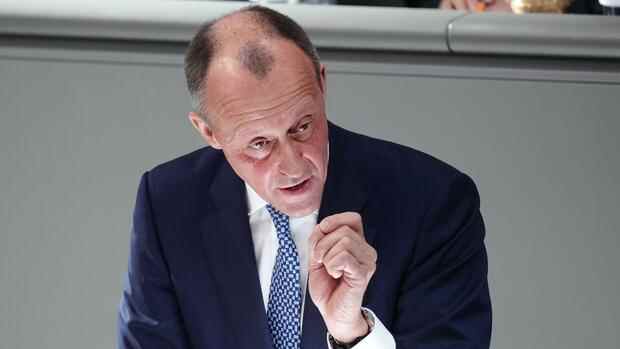The chairman of the Foreign Affairs Committee in the Bundestag, Michael Roth (SPD), told the Handelsblatt that he could only warn against such a debate. “NATO does not intervene in the Russian war against Ukraine. There is no doubt about it.” The consequences of an intervention are likely to be “unpredictable and dramatic”.
At the same time, Roth emphasized: “We are definitely not neutral, we support Ukraine in many ways, including militarily. But that doesn’t make us a war party, as Putin keeps claiming.”
Sharp criticism of Merz also comes from the chairman of the environmental committee in the Bundestag, Harald Ebner (Greens). “It’s playing with fire,” said Ebner. “We certainly don’t need militaristic tones these days and it frightens me how carelessly some people say them today.”
During his visit to the Bundeswehr Operations Command on Friday, Chancellor Olaf Scholz (SPD) advised “keeping a cool head”. He categorically ruled out NATO intervention in the war.
“It is absolutely clear to us that there will be no NATO military involvement in this conflict. We will rule that out with everything we do,” said the Chancellor.
Scholz: Efforts “purely defensive”
For NATO it is about ensuring that nobody attacks the territory of the alliance countries. “That’s why we stepped up our joint efforts at the border, starting with the Baltic States through Poland, Slovakia, Hungary, Romania and Bulgaria,” he said. “But they are purely defensive and they remain on NATO territory.”
Merz had brought NATO intervention into play in the event that there should be targeted attacks on nuclear power plants. “There may be a situation in which NATO then also has to make decisions to stop Putin,” Merz told radio station NDR Info on Friday. But it’s not that far, he stressed.
However, if nuclear power plants were attacked, “if even the reactor blocks were to be hit, then we are directly threatened by the effects of this war”. In this case, NATO must consider whether this is also an attack on its own territory.
The nuclear power plant in Zaporizhia, Ukraine, caught fire after being shelled by invading Russian troops, raising fears of a nuclear disaster like the one in Chernobyl in 1986. According to the Ukrainian authorities, the fire has been extinguished and, despite some damage, the safety of the reactor is not at risk.
Reluctance on the part of Saarland’s head of government, Hans
Merz said he assumes that governments, the EU and NATO are considering an intervention scenario. “The attacks and the way this war is being fought are taking forms that are thought-provoking.”
Saarland’s Prime Minister Tobias Hans (CDU) was cautious. He was convinced that “a military option” had to be presented in order to persuade Russia to negotiate the war.
The attack on a Ukrainian nuclear power plant endangers “not only Europe as a whole, but also the Russian people,” said Hans on Friday in St. Ingbert, Saarland, on the fringes of a closed meeting of the CDU federal executive board. That is why it is now necessary to discuss “how to deal with this new form of escalation”
>> Read also: Nuclear expert Sailer sees risks from spent fuel elements in the Zaporizhia nuclear power plant.
However, “at this point in time, it cannot be about a military intervention by NATO in Ukraine”, but only about preparation for further escalation levels. When asked whether an attack on a nuclear power plant could already be a reason for a NATO deployment, Hans said: “In any case, what happened there must be investigated.” Both in NATO and in the UN Security Council the new situation must be discussed.
In the opinion of the environmental policy spokesman for the Greens, Stefan Wenzel, the attacks on nuclear power plants showed “the unscrupulousness of Russian warfare, which accepts a nuclear accident and its consequences with approval,” said Wenzel. Against this background and in view of increased cyber attacks on critical infrastructure in the West, too, he called for the safety requirements for nuclear plants throughout Europe to be reviewed.
“Up until now, a military conflict has not been one of the possible threat scenarios for nuclear reactors and wet storage facilities for fuel elements,” said Wenzel. The risk of a nuclear accident can only be limited if complex systems such as power supply, emergency cooling, black start capability, supply of operating materials, shift changes for the operating teams and nuclear supervision are guaranteed at all times.
More: Horror after attack on nuclear power plants in Ukraine: What dangers does the war pose?
